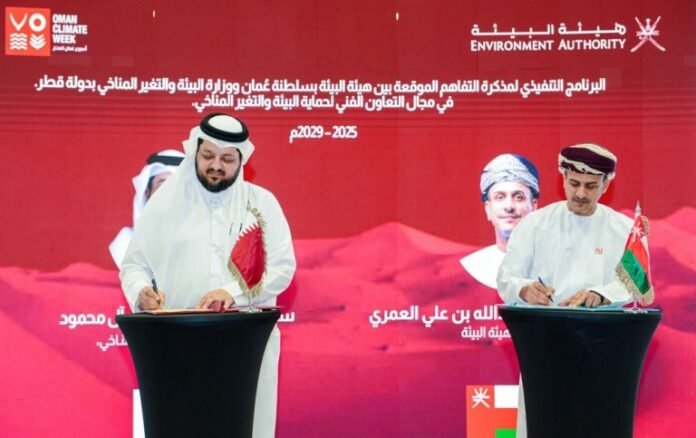Oman and Qatar have signed a significant memorandum of understanding (MoU) to enhance environmental cooperation from 2025 to 2029. Dr Abdullah bin Ali al Amri, Chairman of Oman’s Environment Authority, and Abdulaziz bin Ahmed al Mahmoud, Undersecretary of Qatar’s Ministry of Environment and Climate Change, finalized the agreement on Tuesday.
This partnership was formalized during Oman Climate Week, underscoring the two nations’ shared dedication to sustainability. The MoU outlines joint projects aimed at advancing environmental protection and ecological conservation across both countries.
The agreement focuses heavily on wildlife conservation, particularly protecting endangered species. Oman and Qatar will also work together to manage invasive species, rehabilitate vegetation cover, and implement sustainable management practices for nature reserves. One potential initiative is to twin wildlife reserves between both countries to improve conservation efforts.
Breeding centres for indigenous animal species will be developed as part of the collaboration. Oman and Qatar will also create training programmes in animal care and breeding. In addition, research will be conducted on animal reproduction, behaviour, and nutrition, alongside strengthening management systems for endangered species.
Both nations also agreed to improve falconry practices. Their efforts will ensure that these practices meet scientific and technical standards. Marine conservation efforts will include joint initiatives in coastal protection and reducing marine pollution. Experts from both countries will track sea turtle migration patterns, especially hawksbill turtles, using satellite tracking. Efforts will also be made to protect whale sharks, mangrove forests, and coral reefs.
The MoU will drive research in areas such as wildlife breeding, plant gardens, and marine mammal strandings. A unified environmental performance index will be developed. This will help both nations assess their progress in various conservation projects. The MoU also supports capacity-building on hazardous waste management, with workshops and technical visits to enhance expertise in this area.
In tackling climate change, the agreement emphasizes collaboration on air pollution control, greenhouse gas reduction, and ozone layer protection. Experts from both countries will focus on adapting to climate change, building resilience in vulnerable ecosystems, and creating sustainable governance models.
Dr Abdullah bin Ali al Amri noted that this collaboration would enhance knowledge-sharing between Oman and Qatar, particularly in biodiversity conservation and climate change mitigation. Oman’s experience in implementing environmental policies will significantly contribute to the partnership’s success.
Environmental Cooperation Between Oman and Qatar Strengthened
Oman and Qatar have signed a significant memorandum of understanding (MoU) to enhance environmental cooperation from 2025 to 2029. Dr Abdullah bin Ali al Amri, Chairman of Oman’s Environment Authority, and Abdulaziz bin Ahmed al Mahmoud, Undersecretary of Qatar’s Ministry of Environment and Climate Change, finalized the agreement on Tuesday.
This partnership was formalized during Oman Climate Week, underscoring the two nations’ shared dedication to sustainability. The MoU outlines joint projects aimed at advancing environmental protection and ecological conservation across both countries.
The agreement focuses heavily on wildlife conservation, particularly protecting endangered species. Oman and Qatar will also work together to manage invasive species, rehabilitate vegetation cover, and implement sustainable management practices for nature reserves. One potential initiative is to twin wildlife reserves between both countries to improve conservation efforts.
Breeding centres for indigenous animal species will be developed as part of the collaboration. Oman and Qatar will also create training programmes in animal care and breeding. In addition, research will be conducted on animal reproduction, behaviour, and nutrition, alongside strengthening management systems for endangered species.
Both nations also agreed to improve falconry practices. Their efforts will ensure that these practices meet scientific and technical standards. Marine conservation efforts will include joint initiatives in coastal protection and reducing marine pollution. Experts from both countries will track sea turtle migration patterns, especially hawksbill turtles, using satellite tracking. Efforts will also be made to protect whale sharks, mangrove forests, and coral reefs.
The MoU will drive research in areas such as wildlife breeding, plant gardens, and marine mammal strandings. A unified environmental performance index will be developed. This will help both nations assess their progress in various conservation projects. The MoU also supports capacity-building on hazardous waste management, with workshops and technical visits to enhance expertise in this area.
In tackling climate change, the agreement emphasizes collaboration on air pollution control, greenhouse gas reduction, and ozone layer protection. Experts from both countries will focus on adapting to climate change, building resilience in vulnerable ecosystems, and creating sustainable governance models.
Dr Abdullah bin Ali al Amri noted that this collaboration would enhance knowledge-sharing between Oman and Qatar, particularly in biodiversity conservation and climate change mitigation. Oman’s experience in implementing environmental policies will significantly contribute to the partnership’s success.


